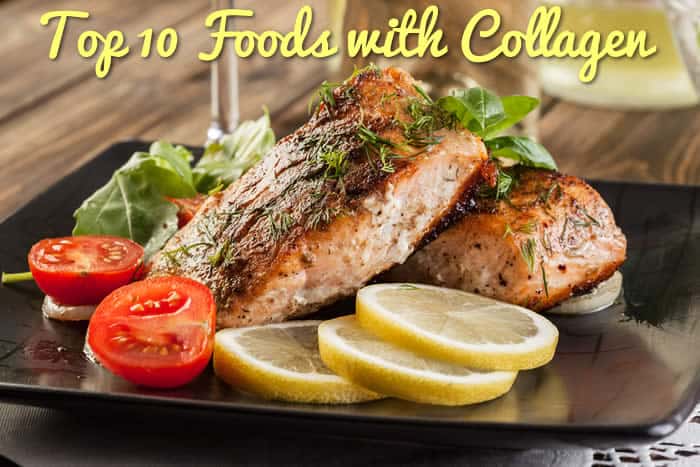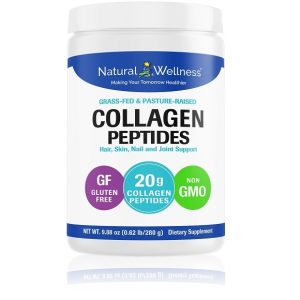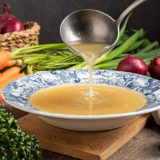

Few substances are as abundant in the human body as collagen, which accounts for roughly 30% of your total protein makeup. (1) If you’re looking for ways to support optimal health by getting more collagen in your diet, eating certain foods can help. First, let’s talk about what this protein is and why it’s so important.
What is collagen?
Collagen is a stretchable fiber-like protein used by the body to form connective tissues. There is collagen in your skin and cartilage, as well as in your muscles, tendons, and bones. (2) You’ll also find this protein in your organs, within the lining of your intestines, and even in your blood vessels. (1)
On its most basic level, collagen is a triple helix structure made up of proline, glycine, and hydroxyproline. These amino acids work together to make your bodily tissues more elastic and stable while also providing them with greater strength and support. (3)
Collagen’s Health Benefits
Collagen has many important roles in the body. They include: (1)
- Getting rid of old, dead skin cells and supporting the growth of new ones while also making your skin healthier, stronger, and more elastic
- Creating a covering that helps protect your internal organs
- Improving the ability of your blood to clot if you’re cut
Research also connects collagen peptide supplementation with greater joint health (reduced joint pain and improved joint function), improved body composition (less fat and more muscle), and improvements in muscle strength and recovery. (4)
Consequences of Low Collagen Levels
The body tends to produce less collagen as you age, with the collagen that it does produce also being lower in quality and breaking down at a faster rate. (1) How do you know if you might have low collagen levels?
Here are some signs to watch for: (5)
- wrinkled or sagging skin
- muscle aches and weakness
- joint pain
- reduced flexibility
- increased stiffness
- gastrointestinal issues
Optimal 10 Foods with Collagen

One way to increase your collagen intake is to consume foods rich in the amino acids that make up this protein. Eating foods high in vitamin C, copper, and zinc also helps promote your body’s natural collagen production. (5)
Many of these foods are animal-based, with some plant-based options if you follow more of a vegetarian diet.
The top foods high in collagen are:
- beef
- bone broth made from boiling beef, pork, chicken, or fish bones
- offal meats, also known as organ meat (kidney, heart, brains, liver, etc.)
- chicken or turkey, with the skin on
- fish such as sardines, tuna, salmon, cod, and trout—especially when consuming their bones and scales
- egg whites
- berries
- citrus fruit
- broccoli
- tomatoes
How to Get More Foods Rich in Collagen in Your Diet
If you don’t already have these types of collagen-rich foods in your diet, finding ways to increase their intake can help. When creating your weekly meal plans, add meats like pot roast, grilled skin-on chicken, and fish fried in olive oil to your menu. Include a few egg white omelets in your morning eating plans.
Other foods that contain collagen can be consumed as side dishes. Add a side salad with tomatoes to your dinner one night or two each week, or choose steamed broccoli instead. Citrus fruit and berries make great desserts or snacks, so you can work those in as well.
Additional Ways to Increase Your Collagen Levels
There are a few additional actions you can take to help support healthier collagen levels in your body. Here are some to consider: (1, 2)
- limit your sun exposure to 10-20 minutes per day, no more than 3-4 times per week
- when you do go in the sun, wear sunscreen with an SPF of 30 or higher
- aim for 7-9 hours of sleep per night
- if you smoke, quit; also do your best to avoid secondhand smoke
- get regular physical activity
- eat a diet high in fruit, vegetables, whole grains, nuts, and beans
- reduce your intake of sugar and refined carbohydrates
- work to lower your stress levels
 It may also be beneficial to take a collagen supplement. Studies have shown that collagen supplementation supports healthy skin aging by reducing wrinkles and improving the skin’s elasticity and hydration. (6) Other pieces of research have connected oral collagen intake with improved osteoarthritis symptoms (7), greater muscle mass when strength training (8), improvements in some measures related to cardiovascular health (9), and more.
It may also be beneficial to take a collagen supplement. Studies have shown that collagen supplementation supports healthy skin aging by reducing wrinkles and improving the skin’s elasticity and hydration. (6) Other pieces of research have connected oral collagen intake with improved osteoarthritis symptoms (7), greater muscle mass when strength training (8), improvements in some measures related to cardiovascular health (9), and more.
Natural Wellness offers a Collagen Peptides supplement. It consists of hydrolyzed, grass-fed, pasture-raised collagen peptides to support healthy hair, skin, nails, and joints.




